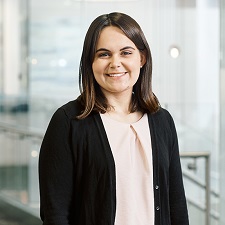The interview below is part of an ongoing effort by McGuireWoods to profile women leaders in private equity (PE). To read previous profiles, click here. To recommend a woman for a future interview, email WPEF@mcguirewoods.com.

Lauren Morera is a senior associate for Audax Private Equity, based in Boston. Audax is a middle market PE firm focused on a buy-and-build approach dedicated to partnering with management teams to drive value creation, build winning teams and accelerate results.
Prior to joining Audax in 2017, Morera worked at Credit Suisse on the investment banking team within the financial institutions group covering banks and specialty finance companies. At Audax, she focuses primarily on the business services and consumer industries. Morera received a bachelor’s degree in operations research and financial engineering from Princeton University.
Q: Why is it important for more women to pursue careers in PE?
Lauren Morera: Over the past few years working in PE, I’ve come to find that success begets success. This translates to all facets of my experience, from our ability to garner high investment returns to any firm’s ability to get and retain talented individuals. When talented young professionals are looking for their next opportunity, they want to go to a place where they know they’ll be welcome and where they can visualize their future. Firms that have diversity in their senior ranks are much better positioned to continue diversifying their employee base, and by extension, have better investment returns.
The more that diversity exists in the PE world, the easier it will be for diverse employees to speak their mind and contribute to the broader investment conversations, and the easier it will be for firms to retain them. Creating a culture where anyone — regardless of background — can openly contribute to the conversation is a key step to success for any firm focused on longevity.
As the world changes and more women are running businesses, firms that have focused on gender diversity will inevitably perform better. People naturally gravitate toward those with whom they feel a commonality. Having women on both sides of the table makes for a better working environment for all.
Q: What is a lesson you learned during 2020?
LM: Although many meetings and discussions can be had over video conference, there is no substitute for an in-person meeting when you are making an initial investment in a company. Overall, I found that 2020 made it clear that in the PE profession, 90 percent of your working time can be spent working remotely without any impact to efficiency. However, there’s still that 10 percent of time when meeting someone in person or having a live conversation is imperative.
In the PE industry, traveling was a way of life prior to the pandemic. We traveled once a week on average. Since the pandemic, I’ve traveled three times in 10 months. These three instances have all been final meetings ahead of a large investment decision and were a critical step in our diligence process to determine if we wanted to buy those businesses.
Q: How do you believe women of your generation will be able to influence in the PE industry, particularly as the career path continues to evolve?
LM: From where I sit, women in my generation have a tremendous opportunity to help shape the future of the industry by fighting for seats at the table when important conversations are being had regarding investing, but also concerning human resources policies around recruiting and parental leave. Many PE firms now recognize the need for gender diversity and are actively pushing for it, but in the senior ranks, that gender diversity still falls short.
At my level and below within Audax, we’re split 50/50 in terms of gender, which is really helping to normalize the dynamic of having a woman in every meeting. Having sat through countless meetings as the only woman in the room, I’ve often seen instances where a colleague or management team member may say something with inherent gender bias and not realize the implications of their statements. Normalizing a female presence will help to erode these biases over time, opening the door to allow more women to join the profession, thereby diversifying perspectives and decision-making in each room and allowing for better-informed investment decisions.
Diversifying the employee base creates more opportunity for the business owners of companies we buy, PE professionals in the industry and future PE professionals who don’t yet know what PE is. My generation is on the forefront of pushing these changes through the system, and although it will take time, there’s now a path to a more equitable gender split across the industry.
Q: What is a lesson that you have learned concerning what’s required for success in PE?
LM: The key to success in any investment is learning how to prioritize. At the junior level, you need to learn how to juggle competing assignments for multiple portfolio companies without dropping the ball or turning work around late.
Once you’ve mastered that skill, prioritization takes another form. As you talk with portfolio companies, you realize there are 100-plus things they could be doing to make the business better, but if the team tries to do all of those, they’ll inevitably fail. As a vice president/managing director, you need to understand which actions will create the biggest equity value opportunity and learn how to align the management team to those goals. When looking at new investment, you need to know which questions to prioritize that will allow you to most quickly answer, “Do I want to buy this business?”
Understanding that everything can’t be done at once and learning what to push ahead over other items are critical to your success and the success of the investment.
To contact Lauren Morera, email lmorera@audaxgroup.com.